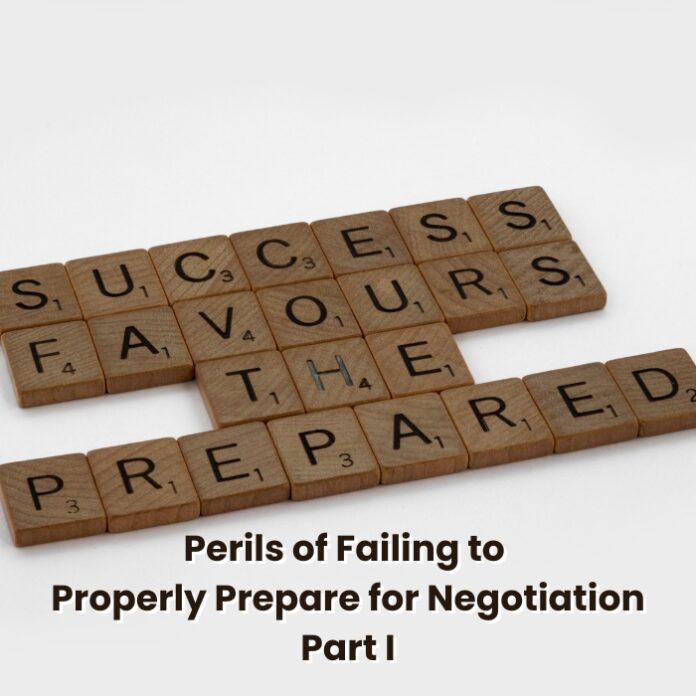If you’re looking to up-level your negotiation abilities, what’s the one thing you’re most likely to focus on? If you’re like most people, you’d go looking for tips on negotiation tactics. While it’s helpful to understand tactics, the most important element of effective negotiation is preparation. Sadly, it’s typically the most over-looked element in the process. The cost for that oversight is high.
Let’s first explore the perils of failing to properly prepare for negotiation. In Part I of this mini-series, we’ll uncover why preparation is important and the pitfalls of ignoring the process. In the next instalments, we’ll turn to some simple solid strategies you can use to boost your preparation effectiveness.
When people think of the elements of negotiation, leverage, tools, and skills usually first jump to mind. Leverage, tools and skills are valuable in a negotiation, but without effective preparation they are largely wasted. Even with leverage on your side, failing to consider, with intention, how to best use it is a lost opportunity. Having power without strategy, facts or focus renders the power of little value. Preparation will almost always trump power without preparation. In fact, preparation is power in a negotiation.
Likewise, skills without focus and direction will be of little use. We all know of examples of people with natural talents who never achieve their potential as they don’t work at the talent. No practice, no preparation, no results. I’ve often seen a naturally skilled negotiator get bested by someone with less natural skill and ability, but who put in the work to prepare for the negotiation.
Diligent and intentional preparation can level the playing field and then some. In fact, some experts suggest that preparation accounts for 45% of ones’ success in bargaining. Rushing into a negotiation without thorough preparation is one of the top negotiation mistakes, as is trying to fly by the seat of your pants. Preparation first involves preparing yourself – doing the inner work necessary to be able to show up as the best version of yourself. Also be sure to consider the other party. Prepare for how to best deal with each individual negotiation counter-part. Once you’ve mastered that, then turn to the process of the negotiation and how you can best utilize process for best outcomes. Then comes the preparation for the substance or matter of the negotiation.
Note that having strongly held views about what you want is not enough. I’ve seen many deals fall apart because one or both parties hadn’t done their preparation. You can end up walking away from a deal that could have benefitted you, or alternatively jump into a deal that doesn’t if you haven’t been thorough in your prep process.
Without systematic preparation processes, you’re more likely to become attached to a particular result and lack the requisite flexibility to come up with more creative outcomes that better serve both parties. This attachment blocks opportunities for better solutions and can have beneficial deals go south and/or disastrous deals go forward.
Ego is also more likely to show up in the room when you haven’t done your homework in advance. You’ll lack the requisite clarity and focus to make informed decisions. You’ll be easier to manipulate, less likely to keep your eye on the real target, and less likely to ascertain the needs of the other party – all of which are the kiss of death in most negotiations.
Fears are more likely to raise their ugly heads and tank your effectiveness and outcomes when you haven’t properly prepared. Fear of ‘losing’ and fear of the unknown are particularly popular problems arising from lack of preparation as is fear of being judged. You’re more likely to become reactive when these fears kick in and when you haven’t planned for all contingencies.
In addition, failure to fully prepare likely means you’ve forfeited valuable opportunities to consider the most advantageous timing and setting for your negotiations – both of which can move the dial when brought to bear with foresight. You won’t have the benefit of knowing your deep ‘why’ to keep you on track and motivated to get best results.
Perhaps most importantly, at the core of the negotiation, you won’t be likely to choose ‘who’ you show up as in the negotiation. This single factor alone can ensure better outcomes when approached with intention.
In addition to these key ‘inner’ aspects of preparation, it goes without saying that doing your homework around knowing your best alternative to a negotiated agreement (BATNA) as well as your resistance point/reservation price; setting your aspiration levels; having all relevant facts and figures (both for and against your position); exploring all possible arguments to support your position and anticipating those of the other party; prioritizing your interests and expecting the other party’s likely priorities; planning for concessions; determining best processes for improved outcomes; contemplating both yours and the other party’s potential biases; determining where the likely zone of potential agreement (ZOPA) lies; etc. are instrumental and should all be part of your regular preparation process.
Negotiation at its heart is about the art of influence and persuasion. Preparation enhances your ability to do both. Your success in negotiation largely depends on the quality of your preparation.
Hopefully, this has raised your awareness about the inherent value in preparation. In our next instalment, let’s dig in to a few of my favorite signature preparation models to help you get the best possible outcomes in your negotiations. And remember, all of life is a negotiation so you can apply these models to great effect in both your personal and professional life.





